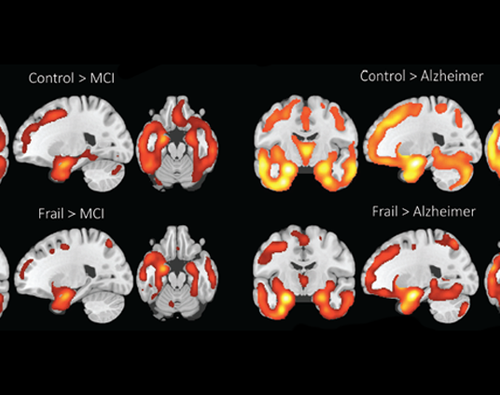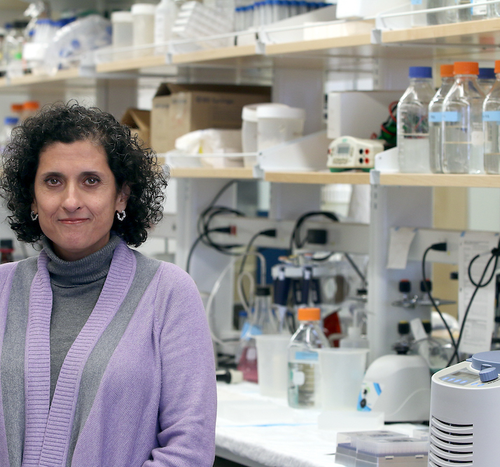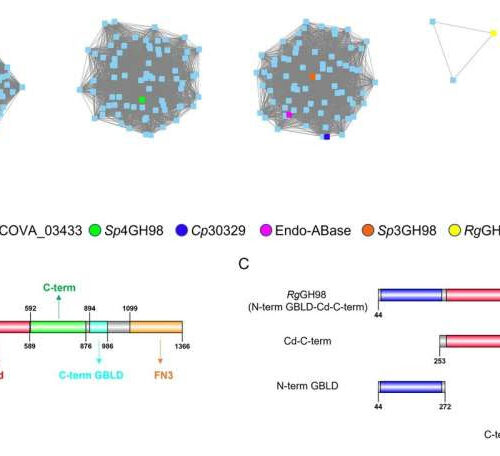by Don Arnold, The Conversation Credit: Pixabay/CC0 Public Domain All memory storage devices, from your brain to the RAM in your computer, store information by changing their physical qualities. Over 130 years ago, pioneering neuroscientist Santiago Ramón y Cajal first suggested that the brain stores information by rearranging the connections, or synapses, between neurons. Since...
Study uncovers how cancers resist targeted treatment
by Institute of Cancer Research Fig. 1: Identification of trapped PARP1-interacting proteins. a, Schematic describing the identification of trapped PARP1 protein–protein interactomes via RIME or proximity labeling linked to mass spectrometry. The cells were exposed to either PARPi + MMS (to enable trapping) or MMS (no trapping) for 1 h, after which PARP1-interacting/proximal proteins were identified by mass...
Pill Not Enough for ‘Sexual Problems’ Female Cancer Patients Face
Roxanne Nelson RN, BSN January 05, 2022 The antidepressant bupropion failed to improve sexual dysfunction in female cancer survivors, according to new findings. Using the Female Sexual Function Index (FSFI) as a measurement tool, investigators found that desire scores were not significantly different for participants who received bupropion versus a placebo over the 9-week study period. “Sexual health...
Cognitive decline not always a sign of Alzheimer’s disease
SOCIETY FOR NEUROSCIENCE IMAGE: THE BRAINS OF THE COGNITVELY FRAIL MORE CLOSELY RESEMBLE THE BRAINS OF HEALTHY CONTROLS THAN THOSE OF ADULTS WITH ALZEHEIMER’S DISEASE OR A MILD COGNITIVE IMPAIRMENT. CREDIT: KOCAGONCU ET AL., JNEUROSCI 2022 At the first sign of cognitive trouble, people often worry Alzheimer’s disease is forthcoming. But poor cognition can be...
Researchers uncover new mechanism for deadly blood clots
BRIGHAM AND WOMEN’S HOSPITAL Nearly 80 percent of deaths from type 2 diabetes mellitus (T2DM) are associated with thrombosis, a condition that occurs when blood clots block a vein or artery. Traditionally, it’s been thought that proteins released by damaged blood vessels may lead to inappropriate blood clotting, but a new study from investigators at...
How a potent antifibrotic peptide works and why it could reverse scarring in multiple organs
MEDICAL UNIVERSITY OF SOUTH CAROLINA IMAGE: DR. CAROL FEGHALI-BOSTWICK IS THE SMARTSTATE AND KITTY TRASK HOLT ENDOWED CHAIR IN SCLERODERMA RESEARCH AT THE MEDICAL UNIVERSITY OF SOUTH CAROLINA. CREDIT: SARAH PACK, MEDICAL UNIVERSITY OF SOUTH CAROLINA A research team at the Medical University of South Carolina (MUSC) led by Carol Feghali-Bostwick, Ph.D., reports in the Journal...
Scientists uncover new information about cellular death process, previously thought to be irreversible
UNIVERSITY OF ILLINOIS CHICAGO IMAGE: A COMPOSITE IMAGE OF A CELL THROUGHOUT PYROPTOSIS. CREDIT: GARY MO A study published by researchers at the University of Illinois Chicago describes a new method for analyzing pyroptosis — the process of cell death that is usually caused by infections and results in excess inflammation in the body — and shows...
Who gives consent for treatment when a person with stroke cannot?
AMERICAN ACADEMY OF NEUROLOGY MINNEAPOLIS – Who gives consent for treatment when a person with stroke cannot? The American Academy of Neurology (AAN) is issuing a position statement for neurologists on how to navigate consent issues for people who have experienced acute ischemic stroke. The statement is published in the January 10, 2022, online issue...
N95 respirators can be safely decontaminated up to 25 times, research shows
BETH ISRAEL DEACONESS MEDICAL CENTER BOSTON – N95 respirators are commonly used in hospitals worldwide to protect healthcare personnel from infectious pathogens. During the COVID-19 pandemic, healthcare facilities have experienced shortages of the respirators, forcing personnel to re-use them or resort to less protective masking alternatives. In keeping with guidance from the Centers for Disease Control...
Blood and guts: New link uncovered between the gut microbiome and blood groups
by Quadram Institute Fig 1. In silico analysis of RgGH98. (A) SSN analysis of GH98 family. Amino acid sequences were from the CAZy database (www.cazy.org). A total of 355 GH98 sequences were analyzed by SSN with an alignment score of 120. Each node (blue dot) represents one protein sequence. The functionally characterized enzymes are color...






